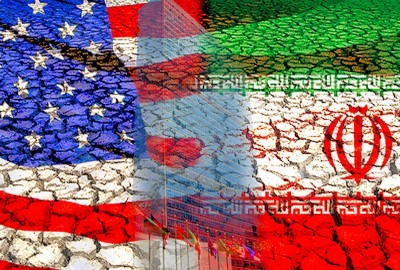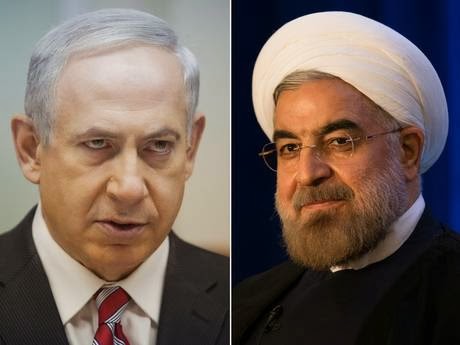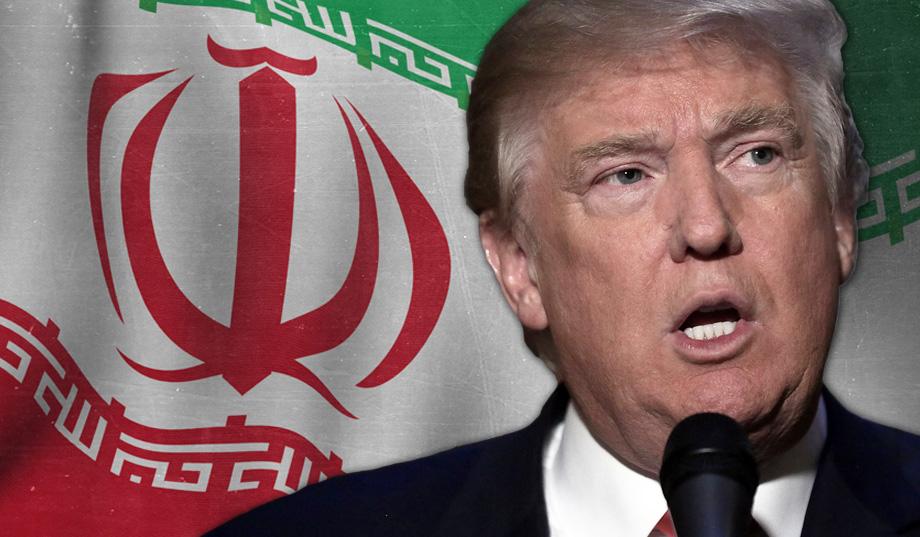U.S. Threatens Iran: Plans To “Review Policy” And Deal With Them Before New Administration Comes To Power

After launching the disastrous missile strikes against Syrian military forces that resulted in the killing of Syrian soldiers, civilians, and children as well as sending ships toward North Korea in a flagrant act of aggression and dropping the largest known non-nuclear bomb on Afghanistan, the Trump administration is now taking aim at Iran.
Sounding much like it did after its bizarre and unprovoked “putting Iran on notice” speech made by former Trump administration official Michael Flynn, the United States is now “reviewing its policy” on Iran and warning the world of the dangers of a nuclear Iran.
Ironically, the United States is warning of an Iran terrorizing the world with its bombs, funding “militias” across the world, and expanding its influence in the region by force as well as unprovoked aggression against specific countries. If there were a field of psychology for geopolitics, these statements would be classified as a clear example of projection if ever there was one.
“Whether it be assassination attempts, support of weapons of mass destruction, deploying destabilizing militias, Iran spends its treasure and time disrupting peace,” Tillerson said. “An unchecked Iran has the potential to travel the same path as North Korea ‒ and take the world along with it.”
“Iran is the world’s leading state sponsor of terrorism, and is responsible for intensifying multiple conflicts and undermining US interests in countries such as Syria, Yemen, Iraq and Lebanon, and continuing to support attacks against Israel.”
“An unchecked Iran has the potential to travel the same path as North Korea ‒ and take the world along with it,” he added.
Tillerson also stated that Iran supports the “brutal Assad regime” and that it supports the Houthis in Yemen, as well as accusing Iran of “undermining security in Iraq for years” by virtue of its support for Quds forces fighting there. Tillerson also accused Iran of maintaining “a long-standing hostility towards Israel, providing weapons, training and funding to Hamas and other Palestinian terrorist organizations.”
“A comprehensive Iran policy requires that we address all of the threats posed by Iran, and it is clear there are many,” he said.
Tillerson then turned to the Iran nuclear deal which has been the target of both the Trump administration and traditional Republicans since day one, claiming that it
“fails to achieve the objective of a non-nuclear Iran ‒ it only delays their goal of becoming a nuclear state. This deal represents the same failed approach of the past that brought us to the current imminent threat that we face from North Korea.”
Tillerson added that
“The Trump administration has no intention of passing the buck to a future administration on Iran. The evidence is clear: Iran’s provocative actions threaten the United States, the region and the world.”
In addition, he stated that the United States will “meet the challenges Iran poses with clarity and conviction” after the policy review is over.
Tillerson echoed statements uttered by Defense Secretary James Mattis earlier in the week, who accused Iran of trying destabilize the Middle East.
“Everywhere you look if there is trouble in the region, you find Iran. We will have to overcome Iran’s efforts to destabilize yet another country and create another militia in their image of Lebanese Hezbollah but the bottom line is, we are on the right path for it.”
Mattis’ statement came after meeting with senior Saudi officials in Riyadh.
The Path to Persia
The plan for a Western or a Western/Israeli attack on Iran, along with the theatre of alleged US-Israeli tensions leading up to a strike and outright war, has been in the works for some time. For instance, in 2009, the Brookings Institution, a major banking, corporate, and military-industrial firm, released a report entitled “Which Path To Persia? Options For A New American Strategy For Iran,” in which the authors mapped out a plan which leaves no doubt as to the ultimate desire from the Western financier, corporate, and governing classes.

The plan involves the description of a number of ways the Western oligarchy would be able to destroy Iran including outright military invasion and occupation. However, the report attempts to outline a number of methods that might possibly be implemented before direct military invasion would be necessary. The plan included attempting to foment destabilization inside Iran via the color revolution apparatus, violent unrest, proxy terrorism, and “limited airstrikes” conducted by the US, Israel or both.
Interestingly enough, the report states that any action taken against Iran must be done after the idea that Iran has rejected a fair and generous offer by the West has been disseminated throughout the general public. The report reads,
…any military operation against Iran will likely be very unpopular around the world and require the proper international context— both to ensure the logistical support the operation would require and to minimize the blowback from it. The best way to minimize international opprobrium and maximize support (however, grudging or covert) is to strike only when there is a widespread conviction that the Iranians were given but then rejected a superb offer—one so good that only a regime determined to acquire nuclear weapons and acquire them for the wrong reasons would turn it down. Under those circumstances, the United States (or Israel) could portray its operations as taken in sorrow, not anger, and at least some in the international community would conclude that the Iranians “brought it on themselves” by refusing a very good deal.
Ironically, it is admitted by the authors of the report that the Iranians are not governed by lunatics intent on nuking the world but by entirely rational players. Still, they move forward with a number of options for attacking Iran. It should thus be obvious to anyone reading this report that the US, NATO, and Israel are uninterested in peace with Iran and are entirely focused on war and Iranian destruction.
“The so-called “Iran deal,” introduced during the administration of US President Barack Obama, represents precisely this “superb offer,” with Flynn’s accusations serving as the “turn down” ahead of the “sorrowful” war and attempted regime change the US had always planned to target Tehran with,” writes Tony Cartalucci of Land Destroyer Report.
The report continues to discuss the citations that could be used for an attack on Iran, clearly stating its intentions to create a plan to goad a non-threatening nation into war. It states,
The truth is that these all would be challenging cases to make. For that reason, it would be far more preferable if the United States could cite an Iranian provocation as justification for the airstrikes before launching them. Clearly, the more outrageous, the more deadly, and the more unprovoked the Iranian action, the better off the United States would be. Of course, it would be very difficult for the United States to goad Iran into such a provocation without the rest of the world recognizing this game, which would then undermine it. (One method that would have some possibility of success would be to ratchet up covert regime change efforts in the hope that Tehran would retaliate overtly, or even semi-overtly, which could then be portrayed as an unprovoked act of Iranian aggression.)
The question of the Israeli role in the possible attack against Iran is also mentioned by Brookings. In fact, in the chapter entitled, “Allowing or Encouraging An Israeli Military Strike,” Brookings not only outlines a potential strategy but essentially admits that the US-Israeli tension being hyped in the Western media is nothing more than a farce. It says,
..the most salient advantage this option has over that of an American air campaign is the possibility that Israel alone would be blamed for the attack. If this proves true, then the United States might not have to deal with Iranian retaliation or the diplomatic backlash that would accompany an American military operation against Iran. It could allow Washington to have its cake (delay Iran’s acquisition of a nuclear weapon) and eat it, too (avoid undermining many other U.S. regional diplomatic initiatives).
Why Iran?
There are a number of reasons why the United States and the NATO imperial army would like to see Iran destroyed over the coming years. Geopolitical reasons are, of course, front and center.
On one level, the Israeli connection stands as one obvious reason the United States has maintained an anti-Iran posture for nearly two decades. Iran not only stands as a regional opponent to the whims and aims of the Israeli settler state, but it also bankrolls and supports one of the greatest forces of opposition to Israel directly due to its close proximity and the militia’s military prowess. Indeed, Israel was humiliated by Hezbollah in front of the world in 2006. Thus, if Iran is destroyed, Hezbollah goes with it and two of Israel’s biggest and most effective opponents disappear from the game board.
 The United States also sees Iran as an opponent due to Iran’s resistance to the Anglo-American insistence on global hegemony of its “Western” system of financial and corporate overseers in a plantation owned by a world oligarchy. Iran stands in opposition to the Western system because it refuses to engage in a system private central banking as well as corporate and private financier domination of its society and culture. Maintaining its own national bank has long been a source of irritation for Wall Street and City of London vampires eager to sink their fangs into the blood supply of every nation on earth. In addition, Iran has recently announced that it would be dropping the U.S. dollar for some other currency or basket of currencies beginning March 21, a sure sign that a Western war of aggression is most definitely on the horizon.
The United States also sees Iran as an opponent due to Iran’s resistance to the Anglo-American insistence on global hegemony of its “Western” system of financial and corporate overseers in a plantation owned by a world oligarchy. Iran stands in opposition to the Western system because it refuses to engage in a system private central banking as well as corporate and private financier domination of its society and culture. Maintaining its own national bank has long been a source of irritation for Wall Street and City of London vampires eager to sink their fangs into the blood supply of every nation on earth. In addition, Iran has recently announced that it would be dropping the U.S. dollar for some other currency or basket of currencies beginning March 21, a sure sign that a Western war of aggression is most definitely on the horizon.
Iran also remains a close Russian ally and the last domino that needs to fall before the great Anglo-American army can march forward directly into Russia and break the largest country in the world into “manageable” parts.[1] Once Iran is destroyed, Russia will be largely isolated and left to face the NATO alliance which has been slowly surrounding Russia over the last two decades.
Conclusion
The Trump Administration’s false labeling of Iran as the biggest sponsor of terrorism, ignoring the fact that Iran is one of the most important players in the fight against ISIS and Sunni Islamic extremism in the Middle East as well as the fact that American ally Saudi Arabia is perhaps the biggest purveyor of terrorism in the world, tells everyone what we need to know going forward – the plan to destroy Iran is marching forward without a hitch in another example of seamless transition.
Of course, Iran is opposing America’s policies in Yemen, Syria, Iraq, and Lebanon. It should. The United States’ policy is that of funding, directing, and manipulating terrorists for the purpose of destroying sovereign countries, backing a brutal racist Israeli regime that continually attacks its neighbors, and supporting an equally brutal Saudi dictatorship intentionally slaughtering the Yemeni people. If this is what Iran is opposing, the world owes it a debt of gratitude.
Note
[1] Brzezinski, Zbigniew. The Grand Chessboard. Basic Books. 1st Edition. 1998.

